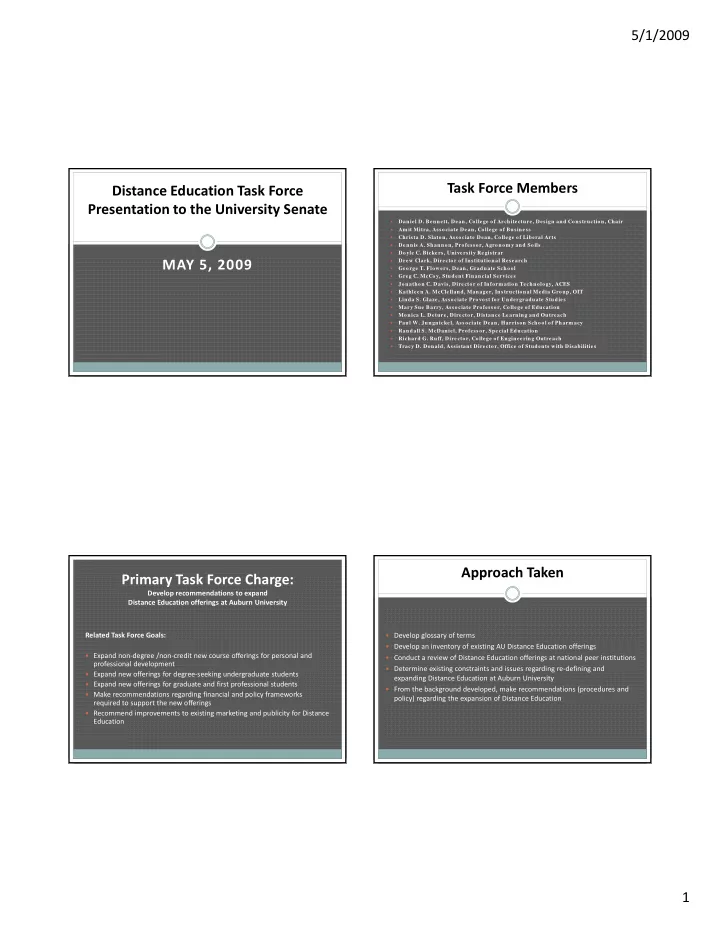

5/1/2009 Task Force Members Distance Education Task Force Presentation to the University Senate Daniel D. Bennett, Dean, College of Architecture, Design and Construction, Chair Am it Mitra, Associate Dean, College of Business Christa D. Slaton, Associate Dean, College of Liberal Arts Dennis A. Shannon, Professor, Agronom y and Soils Doyle C. Bickers, University Registrar MAY 5, 2009 Drew Clark, Director of Institutional Research George T. Flowers, Dean, Graduate School Greg C. McCoy, Student Financial Services Jonathon C. Davis, Director of Inform ation Technology, ACES Kathleen A. McClelland, Manager, Instructional Media Group, OIT Linda S. Glaze, Associate Provost for Undergraduate Studies Mary Sue Barry, Associate Professor, College of Education Monica L. Deture, Director, Distance Learning and Outreach Paul W. Jungnickel, Associate Dean, Harrison School of Pharm acy Randall S. McDaniel, Professor, Special Education Richard G. Ruff, Director, College of Engineering Outreach Tracy D. Donald, Assistant Director, Office of Students with Disabilities Approach Taken Primary Task Force Charge: Develop recommendations to expand Distance Education offerings at Auburn University Related Task Force Goals: Develop glossary of terms Develop an inventory of existing AU Distance Education offerings Expand non ‐ degree /non ‐ credit new course offerings for personal and Conduct a review of Distance Education offerings at national peer institutions professional development Determine existing constraints and issues regarding re ‐ defining and Expand new offerings for degree ‐ seeking undergraduate students expanding Distance Education at Auburn University Expand new offerings for graduate and first professional students From the background developed, make recommendations (procedures and Make recommendations regarding financial and policy frameworks policy) regarding the expansion of Distance Education required to support the new offerings Recommend improvements to existing marketing and publicity for Distance Education 1
5/1/2009 Policy Recommendations Policy Recommendations: Tuition For those disciplines where tuition rates cannot cover required costs and whose offerings are desired by AU for distance delivery, funds should be made available to cover the required costs The offering unit will determine: The university should review the general fund distribution in consideration of needs required to support distance education (the library, OIT, Office of A) Students will be subject to tuition rates set by the offering unit Students with Disabilities, etc.) and determined by market forces and internal cost analysis Provision of campus facilities for distance delivery by participating academic units is recommended (to include production studios, technical staff, OR equipment, etc.) Financial support should be provided to the Office of Distance Learning and B) Students will pay tuition rates based on status Outreach Technology to ensure appropriate technical and marketing support. Marketing should occur through the University web site and other appropriate print and media venues Implement a university ‐ wide assessment of Distance Education. This should be done in a manner that is consistent across the campus (the same for all colleges and schools) and developed in a way that learning can be compared between distance and traditional delivery formats Procedural Recommendations Funding The Office of the Provost, the Graduate School, colleges/schools and Graduate, First Professional Degree and Certificate Programs: departments, along with the Office of Distance Learning and Outreach Technology, will identify subject areas where new distance delivery courses Existing graduate courses and programs will continue to be offered • are desirable to off ‐ campus students in formats developed by the offering unit Start ‐ up funds and costs incurred for developing and offering blocking courses All regularly admitted graduate students will be eligible to take • (including faculty salaries, prep time, IT needs, etc.) will be provided by the distance courses Central Administration from funds obtained through revenue ‐ sharing agreements Off ‐ campus degree/non ‐ degree ‐ seeking students must meet AU’s • minimum admission requirements 2
5/1/2009 The following Five Tier Revenue Sharing Plan Faculty Compensation is proposed: ● The offering unit assumes all of the risk and keeps all revenues (minus the rate to be returned to the Central Administration as set by the Board of The offering unit will determine, through negotiation with faculty, whether Trustees (currently set at $63 per credit hour) compensation for course development will be through release time or through extra compensation ● The Central Administration assumes all of the risk and guarantees recovery of all costs. The offering unit receives 10% of the revenue … the Central Administration retains 90% of the revenue Subject to approval by the Dean and Provost, the offering unit will determine whether faculty will be compensated for teaching a distance course on a “per ● The offering unit funds all instructional costs. The offering unit retains 50% course basis”, a “per student enrollment/per course basis”, or as part of the of the revenue … the Central Administration retains 50% faculty member’s regular on ‐ load assignment ● The offering unit funds all instructional and production costs. The offering unit retains 66% of revenue … the Central Administration retains 34% ● The offering unit assumes all financial risk and guarantees recovery of costs. The offering unit receives 90% of revenue … the Central Administration retains 10% 3
Recommend
More recommend